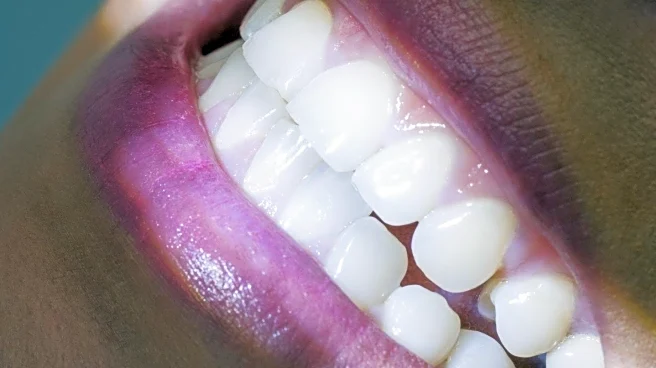What's Happening?
A recent study conducted by Tampere University in Finland has found a significant presence of oral bacteria in arterial plaques of patients with coronary artery disease, suggesting a direct link between oral health and heart attacks. The research involved analyzing coronary plaques from 217 patients, revealing that oral streptococci were present in over 42% of the samples. These bacteria form biofilms that evade immune detection and can become inflamed under stress, potentially causing plaque rupture and triggering heart attacks. The study highlights the role of chronic bacterial infections in transforming stable coronary plaques into rupture-prone ones, contributing to severe atherosclerosis and heart disease.
Why It's Important?
The findings underscore the critical importance of oral health in preventing cardiovascular diseases. By establishing a direct connection between oral bacteria and heart attacks, the study opens new avenues for diagnostics and prevention strategies targeting bacterial infections. This could lead to improved public health policies emphasizing oral hygiene as a preventive measure against heart disease. The research also suggests that managing stress and bacterial infections could be vital in reducing the risk of plaque rupture and subsequent heart attacks, potentially benefiting millions of individuals at risk of cardiovascular complications.
What's Next?
Further research is needed to explore the mechanisms by which oral bacteria contribute to heart attacks and to identify potential exacerbating factors. The study suggests that improving oral health could be a key strategy in preventing heart disease, prompting healthcare providers to consider oral hygiene as part of cardiovascular risk assessments. Additionally, the development of treatments targeting bacterial biofilms in coronary plaques could emerge as a novel approach to reducing heart attack risk.
Beyond the Headlines
The study highlights a broader implication of the interconnectedness between different aspects of health, emphasizing the need for a holistic approach to disease prevention. It raises ethical considerations regarding the accessibility of dental care and the potential socioeconomic disparities in oral health, which could impact cardiovascular health outcomes.









